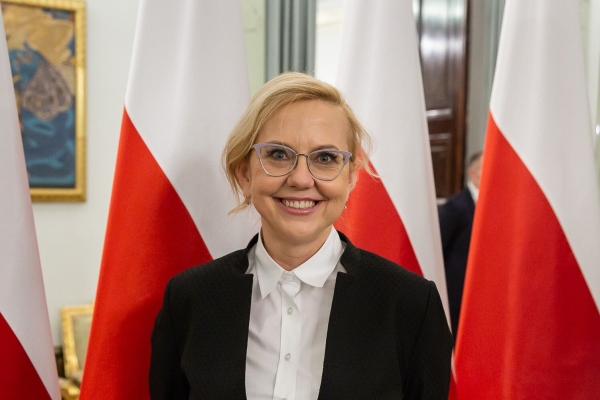Caspian Energy (CE): How is the Polish Hydrogen Strategy 2030 progressing?
Anna Moskwa, Minister of Climate and Environment of the Republic of Poland: After the adoption of the “Polish Hydrogen Strategy until 2030 with an outlook until 2040 (PHS)” and conclusion of the unique “Sectoral Agreement for the Development of the Hydrogen Economy in Poland” between representatives of the Polish administration, business and science, the current work on hydrogen is focused on the creation of a comprehensive legislative package called “Constitution for Hydrogen”. The package shall create a regulatory framework for the functioning of the hydrogen market in Poland and a system of incentives and support for the development of the hydrogen economy and technologies, based on national and EU assumptions.
First of all we implemented changes introducing hydrogen as an alternative fuel for transport. The changes has been made in the Act on the system of monitoring and controlling quality of fuels. The provisions for hydrogen came into force on January 1st, 2023.
On the other hand we introduced changes in the Act on electromobility and alternative fuels. New provisions defines:
-the rules for the development and operation of infrastructure for the use of alternative fuels in transport,
-obligations of public entitles with regard to the alternative fuels infrastructure,
-information obligations regarding alternative fuels,
-conditions of functioning of clean transport zones,
-The National Policy Framework for the development of alternative fuels infrastructure and the manner of its implementation.
In September 2022 came into force delegated act: “Regulation on detailed technical requirements for hydrogen stations”, which regulates operation, modernization and repair of hydrogen stations, including those of a mobile nature.
We have also started actions to create framework for hydrogen economy proposing changes in the Energy Law and certain other acts. Introduction of the provisions contained in this legislative project shall result in legal stability for public and private sector entities operating in the area of hydrogen. At the same time it will have an impact on the full realisation of the potential of this energy carrier.
There are also plans to adopt a law on promoting the production of hydrogen from low-carbon sources which will introduce a support scheme for renewable and low-carbon hydrogen producers. Currently, analytical work is underway at the Ministry on the detailed conception of the rules for this instrument.
Moreover, Ministry of Climate and Environment, in cooperation with other institutions, has been preparing various types of programmes to support the implementation of technologies in the field of production, transport, storage and use of renewable hydrogen, which is also one of the goals of PHS.
CE: Will the turbulence on the gas market accelerate the hydrogen revolution? Looking at what is happening on the market, do you expect hydrogen to first appear in the industry, power and heating sector or in the heavy and public transport?
Anna Moskwa: The Russian military aggression against Ukraine, and the use of gas as a tool for political and economic pressure on Europe, underlines the importance of ensuring our energy security. We need to accelerate the pace of diversification of energy sources, which is a huge opportunity for hydrogen to become one of the pillars of this transformation. Poland, currently one of the leading producers of hydrogen on a global scale, has all the predispositions, expertise and experience necessary to address this challenge. I would like to add that “Polish Hydrogen Strategy” does not prioritise the implementation of the objectives set out therein, which relate primarily to the use of hydrogen in the sectors: energy, transport, industry and district heating. However, introducing hydrogen into the Polish industry is a key element of the PHS due to the amount of emissions generated and the lack of alternative solutions for decarbonisation. However, we predict that the fastest effects of the transformation shall be visible in the transport sector, where vehicles using fuel cells for electricity production are already an alternative to battery electric vehicles, especially in the segment of trucks, vans and urban buses.
CE: Is it possible to create a Baltic gas hub similar to TTF?
Anna Moskwa: Thanks to new transborder infrastructure in the region, new level of market integration, competitiveness and security of supply was achieved. Now it is up to market participants to decide about trading volumes, type of contracts and suppliers to be chosen. Therefore, from our perspective gas hub is something that needs time to emerge and develop. Polish administration has since long supported and will continue to support all relevant diversification projects.
CE: What is the capacity of the new Baltic gas pipeline?
Anna Moskwa: Baltic Pipe is a newly constructed pipeline which can deliver natural gas from Norwegian Continental Shelf, as well as Danish deposits. The capacity of Baltic Pipe towards Poland is 10 bcm/year. Capacity towards Denmark is 3 bcm/year.
CE: What is the role of the Southern Gas Corridor in the EU’s energy security?
Anna Moskwa:The role of the Southern Gas Corridor is very significant. I hope that this corridor will be expanded in future. Europe could definitely use additional supplies from the Caspian Sea deposits. Poland always supports actions towards diversification of gas supplies to Europe. From our perspective, Europe should completely resign from Russian gas, therefore the Southern Gas Corridor is one of the crucial elements of energy security architecture.
CE: To what extent is Poland’s gas infrastructure connected with the European one?
Anna Moskwa: Poland is connected with all of its neighbors within the European Union, as well as Ukraine. In future, capacity of interconnections may increase even further, according to market interest. We are also consistently developing new import infrastructure. Our existing LNG terminal is under expansion. There are also plans for a second LNG receiving terminal. We are also able to deliver natural gas to our partners in Europe.
Thank you for the interview.





